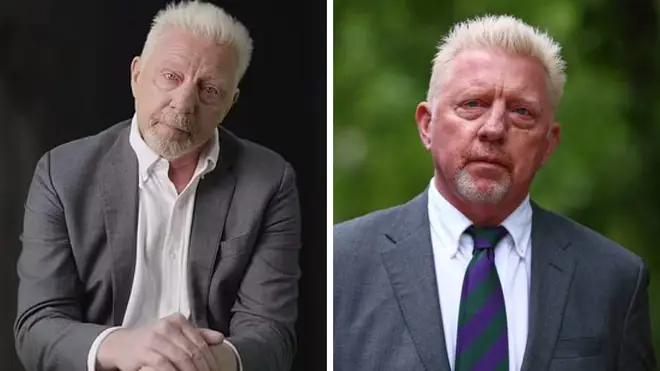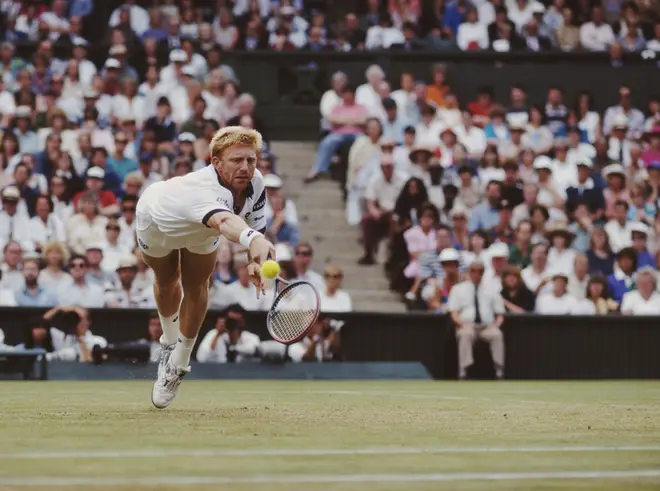
James O'Brien 10am - 1pm
14 December 2022, 22:12

Boris Becker has said he has "hit rock bottom" in a new documentary on the tennis star's conviction for bankruptcy fraud.
The former Wimbledon winner was convicted in April of hiding £2.5 million of assets and loans to avoid paying his debts after declaring bankruptcy.
Becker, who has lived in London since 2012, was jailed for two and a half years, but is expected to be released soon after serving only eight months in prison.
He will then be deported to his native Germany, as a non-British citizen who has been given a prison sentence of more than a year.
#AppleTV+ has landed an upcoming #JohnBattsek-produced docuseries about #BorisBecker.
— tv+ news | all things tv+ (@ATVPlusNews) December 14, 2022
The series, directed by #AlexGibney, follows tennis superstar Becker as he faces bankruptcy and criminal charges after he was convicted of hiding his assets.
(https://t.co/bxfWsHbkm6) pic.twitter.com/MBuZFsvVsX
Speaking in a soon-to-be-released documentary made a few days ahead of his sentencing, an emotional Becker said: "I've hit my (rock) bottom, I don't know what to make of it.
"I (will) face (my sentence), I'm not going to hide or run away. (I will) accept whatever sentence I'm going to get.
"It's Wednesday afternoon and (on) Friday I know the rest of my life."
The Apple TV+ documentary was made by filmmakers who have been documenting the life of Becker, who won Wimbledon aged just 17, for three years in "deeply intimate interviews."

Boris Becker arrives at Southwark Crown Court
Apple TV+ said the documentary, shown in two parts, looks at the three-time Wimbledon champion's tennis career from the start, as well as his "tumultuous" personal life.
The filmmakers also interviewed his immediate family and sporting rivals like John McEnroe, Mats Wilander and Michael Stich.
Novak Djokovic, who was coached by Becker for three years, a period when he won six grand slams, also appears, along with Bjorn Borg.
No title or release date for the documentary have been given yet.

Becker 'had it all and somehow began to think' he was untouchable
Becker, who won six grand slams in total, is being held in Huntercombe Prison in Oxfordshire, where foreign nationals are kept before being deported.
He was accepted for a fast-track scheme that returns criminals to their home countries before their release date. The scheme is intended to save money and alleviate pressure on British jails.
The scheme allows "any foreign national serving a fixed sentence who is liable for removal from the UK to be removed from prison and deported up to 12 months before the earliest release point of their sentence." Up to 135 days are slashed from sentences if offenders agree to go.
It is understood Becker will have to wait until his sentence has expired before he's eligible to apply to return to the UK as a visitor.

Last month, Becker’s former spokesman said: “We are pleased for Boris that he may qualify for an early release and be able to travel to Germany, albeit England has been his home for many, many years. I’m sure it will mean a lot to him and his family to be reunited for Christmas.”
Becker told his trial that his £38m career earnings had been swallowed up by an expensive divorce, child maintenance payments and “expensive lifestyle commitments”.
After he was declared bankrupt over an unpaid £3m loan in 2017, Southwark Crown Court heard he should have declared all assets to independent trustees who would distribute them to creditors.

However, the tennis legend had almost £1m in a business account used as a “piggy bank” for personal expenses. Jurors heard that the pundit and coach quickly transferred around £350,000 to nine recipients.
Becker also failed to declare his share in a £1m property in his German hometown of Leimen, hid an 825,000 euro (almost £700,000) bank loan - worth £1.1m with interest - and concealed 75,000 shares in a tech company, which were valued at £66,000.
Becker was found guilty of four charges, including including failing to disclose, concealing and removing significant assets, under the Insolvency Act 1986.
A Home Office spokesman said: “Any foreign national who is convicted of a crime and given a prison sentence is considered for deportation at the earliest opportunity.”